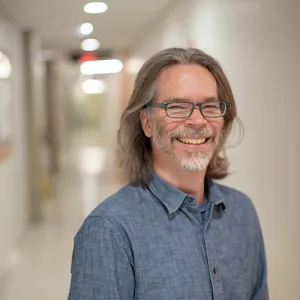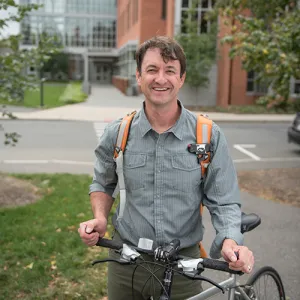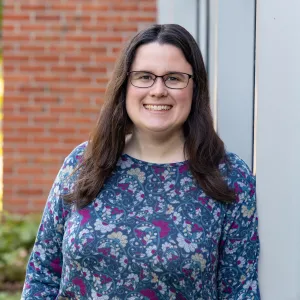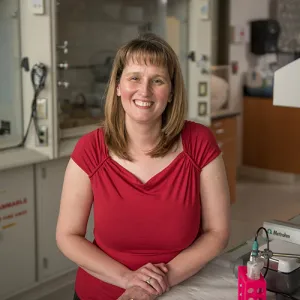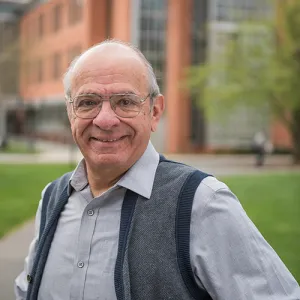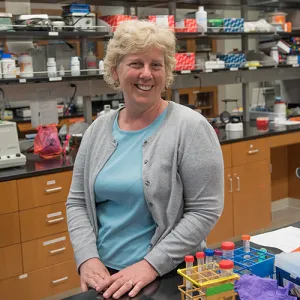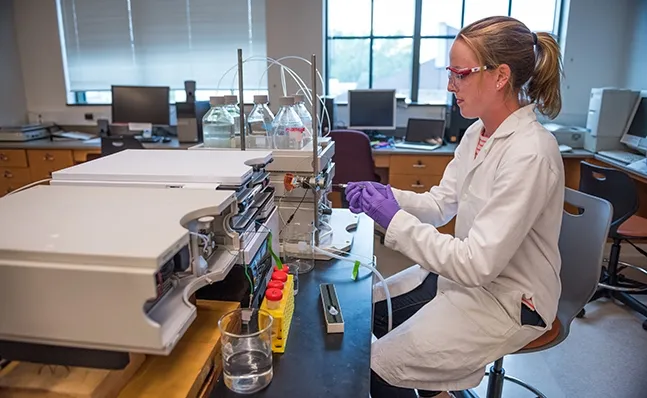Laser scanning confocal microscopy of embryonic muscle cells showing the contractile protein actin (red) and nuclear DNA (blue).
From Veronica Flaconieri ’12
Biochemistry
Biochemistry arose from the fields of biology and chemistry to investigate biological molecules and understand how their interactions result in living systems. In today’s society, understanding in this discipline is essential for informed, critical thinking about many significant issues in science, health and public policy. Biochemistry is an ideal interdisciplinary major for students who want to get a broad scientific foundation, pursue a career in biochemistry or enter the health professions. Smith's biochemistry program has been awarded full accreditation by the American Society for Biochemistry and Molecular Biology (ASBMB)—one of approximately 100 colleges and universities in the country to receive this accreditation.
Department Update
2025–26 Student Liaisons
Seniors
Juniors
Requirements & Courses
Goals for Majors in Biochemistry
- Summarize, explain and critically evaluate published scientific literature. This includes being able to identify the “big picture” ideas, what was known in the field prior to the work being described, and what new information the experiments contribute to the field.
- Write and orally present biochemical content clearly.
- Interpret and analyze data, employing rigorous quantitative skills when necessary.
- Describe the process of scientific research. Be able to recognize and implement critical elements of experimental design (such as proper control experiments), recognize what conclusions can (and cannot) be reasonably be drawn from a given set of experimental results, and understand how to conduct research responsibly.
- Locate and use valid, peer-reviewed sources when doing research.
- Demonstrate a command of essential biochemistry content including knowledge of:
- The structure and function of proteins, nucleic acids, carbohydrates, and lipids
- Enzyme kinetics and inhibition
- Metabolic pathways, including their chemical reactions, regulation and energetic driving forces
- Replication, transcription, translation, gene expression and DNA repair mechanisms
- The different levels of biological organization from single cells to whole organisms
- How to carry out and explain the basis of important biochemical techniques
Biochemistry Major
Requirements
- Foundation biology
- BIO 132/BIO 133 or qualifying test scores for biology (e.g., AP, International Baccalaureate or A levels)
- BIO 202/BIO 203
- BIO 230/BIO 231
- Foundation general chemistry, either:
- CHM 111/CHM 111L and CHM 224/CHM 224L, or
- CHM 118/CHM 118L, this option is strongly encouraged for students with qualifying test scores for chemistry (e.g., AP, International Baccalaureate or A levels)
- Foundation organic chemistry: CHM 222/CHM 222L and CHM 223/CHM 223L
- Foundation biochemistry: BCH 252/BCH 253
- Upper-level biochemistry
- BCH 335 or CHM 332
- BCH 352/BCH 353
- Two electives from the following list, at least one of which must be at the 300 level: BCH 380cc, BCH 390mm, BCH 390pr, BIO 200, BIO 204, BIO 206,
BIO 306, BIO 322sb, BIO 332, BIO 336,
CHM 328, CHM 350, CHM 369, ESS 261.
- The S/U grading option is not allowed for courses counting toward the biochemistry major requirements.
- Students are advised to complete all foundation courses before their junior year.
- Biochemistry majors are encouraged to include research in the form of a special studies or an honors project in their course of study.
Preparation for Graduate Study in Biochemistry and Molecular Biology
Students interested in pursuing further studies in either biochemistry or molecular biology will have a strong academic and experimental background for entrance to graduate school. Students planning graduate study are advised to include a year of calculus and a year of physics in their program of study. Independent research is also highly recommended in preparation for graduate school.
Courses
BCH 252 Biochemistry I: Biochemical Structure and Function (3 Credits)
Structure and function of biological macromolecules: proteins and nucleic acids. Mechanisms of conformational change and cooperative activity; and bioenergetics, enzymes and regulation. Concurrent registration in BCH 253 is required for biochemistry majors. Prerequisites: CHM 111 or CHM 118, CHM 222 and BIO 132. Enrollment limited to 78. Natural Science
Spring
BCH 253 Biochemistry I Laboratory (2 Credits)
Techniques of modern biochemistry: ultraviolet and visible spectrophotometry, spectrofluorimetry, SDS polyacrylamide gel electrophoresis, western blot and mass spectroscopy. Corequisite: BCH 252. Prerequisite: CHM 111L or CHM 118L, CHM 222L and BIO 133. Enrollment limited to 12. Natural Science
Spring
BCH 335 Physical Chemistry of Biochemical Systems (3 Credits)
The course focuses on the tools and methods used to study the physical chemistry of biological systems. Discussions include thermodynamics and equilibria, solution properties, enzyme kinetics and membrane transport processes. Prerequisite: BCH 252 and (CHM 118 or CHM 224). Natural Science
Spring
BCH 336 Physical Chemistry of Biological Systems Laboratory (2 Credits)
This course emphasizes the tools and methods used to study the physical chemistry of biological systems. The laboratory focuses on the applications of experimental techniques in elucidating the principles of biochemical systems. Prerequisite: BCH 252 and (CHM 118 or CHM 224). Corequisite: BCH 335. Natural Science
Spring
BCH 352 Biochemistry II: Biochemical Dynamics (3 Credits)
Chemical dynamics in living systems. Enzyme mechanisms, metabolism and its regulation, energy production and utilization. Concurrent registration in BCH 353 is required for biochemistry majors. Prerequisites: BCH 252, CHM 223, CHM 224 and BIO 202. Natural Science
Fall
BCH 353 Biochemistry II Laboratory (2 Credits)
Investigations of biochemical systems using experimental techniques in current biochemical research. Emphasis is on independent experimental design and execution. Corequisite: BCH 352. Prerequisite: BCH 252, CHM 223, CHM 224 and BIO 202. Enrollment limited to 12. Natural Science
Fall
BCH 380cc Seminar: Topics in Biochemistry-Cancer Cells Out of Control (3 Credits)
Known since the ancient Egyptians, cancers may be considered a set of normal cellular processes gone awry in various cell types. This seminar considers chemical and radiation carcinogenesis, oncogenesis, growth factor signaling pathways and the role of hormones in cancers, as well as the pathologies of the diseases. Prerequisites: BIO 202 or BCH 252. Restrictions: Juniors and seniors only. Enrollment limited to 12. Instructor permission required. Natural Science
Fall, Spring, Variable
BCH 390mm Topics in Biochemical Research Using Advanced Techniques- Molecular Microbiology (4 Credits)
Even with the wealth of microbial genomic data, microbiologists are faced with deciphering the ever-increasing complexity of macromolecules, their regulation and how this impacts bacterial pathogenesis. This hands-on research course utilizes state-of-the-art molecular biology and microbiology techniques in student/faculty-designed projects. This fully integrated lab/lecture course utilizes lectures for experimental design, discussion of relevant literature, protocol development, data analysis and other related topics to support the experimental work in the laboratory section. Prerequisites: BIO 230/BIO 231 or equivalent. Enrollment limited to 12. Instructor permission required. Natural Science
Fall, Variable
BCH 390pr Topics in Biochemical Research Using Advanced Techniques-Proteomics (4 Credits)
This hands-on proteomics research course utilizes state-of-the-art mass spectrometry and proteomics techniques in student/faculty-designed projects. The lecture periods are used for experimental design, discussion of relevant literature, and primers on mass spectrometry data analysis and other related topics, as well as starting experimental protocols that require longer time periods. Prerequisites: BCH 252 and BCH 253. Enrollment limited to 12. Instructor permission required. Natural Science
Fall, Spring, Variable
BCH 400 Special Studies (1-4 Credits)
S/U only. Instructor permission required.
Fall, Spring
BCH 430D Honors Project (4 Credits)
Department permission required.
Fall, Spring
BCH 432D Honors Project (6 Credits)
Department permission required.
Fall, Spring
Crosslisted Courses
BIO 132 Molecules, Cells, and Systems (4 Credits)
Students in this course investigate the structure, function and physiology of cells; the properties of biological molecules; information transfer from the level of DNA to cell-cell communication; and cellular energy generation and transfer. The development of multicellular organisms and the physiology of selected organ systems is also explored. In addition to attending lectures, each student participates in discussion sections that focus on data analysis and interpretation while integrating mechanisms across scales. Concurrent registration in BIO 133 recommended but not required. Enrollment limited to 78. Natural Science
Fall, Spring
BIO 133 Research in Molecules, Cells, and Systems (1 Credit)
This laboratory course introduces students to biological discovery and the biological research process. Students gain hands-on experience with the use of modern biological research methods by participating in ongoing research with a variety of organisms. This includes scientific discovery, hypothesis development, data collection and analysis, as well as presentation of discoveries and results. Research projects vary with each Instructor. Concurrent registration in BIO 132 recommended but not required. Enrollment limited to 16. Natural Science
Fall, Spring
BIO 200 Animal Physiology (4 Credits)
In this course students learn how animal bodies function from the molecular to the organismal level and how the physiology of animals, including humans, has been shaped by evolution to enable survival in a wide range of environments. Course content is organized by body system (cardiovascular, respiratory, reproductive, etc.). Assignments provide opportunities for students to practice applying their knowledge of physiology to real-life situations, predicting the outcomes of experiments, and interpreting and writing about the primary literature. Concurrent registration in BIO 201 is recommended but not required. Prerequisites: BIO 132/ BIO 133 and CHM 111 or CHM 118. Enrollment limited to 30. Natural Science
Fall, Variable
BIO 201 Animal Physiology Laboratory (1 Credit)
This course provides students with the opportunity to design and conduct experiments in human and animal physiology. Emphasis is on developing hypotheses, designing experiments, graphing data, interpreting results, and communicating in the scientific style. Prerequisite: BIO 200, may be taken concurrently. Enrollment limited to 18. Natural Science
Fall, Variable
BIO 202 Cell Biology (4 Credits)
The structure and function of eukaryotic cells. This course examines contemporary topics in cellular biology: cellular structures, organelle function, membrane and endomembrane systems, cellular regulation, signaling mechanisms, motility, bioelectricity, communication and cellular energetics. This course is a prerequisite for BCH 252. Prerequisites: BIO 132/BIO 133 and CHM 222. BIO 203 is recommended but not required. Discussion sections limited to 18. Natural Science
Fall
BIO 203 Cell Biology Laboratory (1 Credit)
Inquiry-based laboratory using techniques such as spectrophotometry, enzyme kinetics, bright field and fluorescence light microscopy, and scanning electron microscopy. The emphasis is on student-designed projects. This course is a prerequisite for BCH 253. Corequisite: BIO 202. Enrollment limited to 16. Natural Science
Fall
BIO 204 Microbiology (3 Credits)
This course examines bacterial morphology, growth, biochemistry, genetics and methods of controlling bacterial activities. Emphasis is on bacterial physiology and the role of the prokaryotes in their natural habitats. The course also covers viral life cycles and diseases caused by viruses. Prerequisites: BIO 132 and CHM 111 or equivalent advanced placement courses. Corequisite: BIO 205. Natural Science
Spring
BIO 205 Microbiology Laboratory (2 Credits)
Experiments in this course explore the morphology, physiology, biochemistry and genetics of bacteria using a variety of bacterial genera. Methods of aseptic technique, isolation, identification and growth of bacteria are learned. An individual project is completed at the end of the term. Corequisite: BIO 204. Enrollment limited to 16. Natural Science
Spring
BIO 206 Plant Physiology (4 Credits)
How do plants work? This course explores key processes in plant physiology and how these processes interact with the (changing) environment. Key concepts include photosynthesis/carbon sequestration, water and nutrient uptake and transport, growth and carbon allocation, and plant-soil interactions. The course encourages students to think about these processes in an environmental justice context e.g. food justice, urban tree resilience and natural climate solutions. Corequisite: BIO 207. Prerequisites: A course in ecology, organismal biology or environmental science. Enrollment limited to 24. Natural Science
Spring, Variable
BIO 230 Genomes and Genetic Analysis (4 Credits)
An exploration of genes and genomes that highlights the connections between molecular biology, genetics, cell biology and evolution. Students analyze the principal experimental findings that serve as the basis for the current understanding of topics in genetics including DNA, RNA, and protein structure and function, gene organization and networks, gene expression and regulation, the origins and evolution of molecular mechanisms, and the relationship between genotypes and phenotypes of interest. Students also examine the computational tools and rapidly expanding databases that have become central to contemporary biology. Concurrent registration in BIO 231 recommended. Prerequisites: BIO 130 or BIO 132 or equivalent. Natural Science
Spring
BIO 231 Genomes and Genetic Analysis Laboratory (1 Credit)
A laboratory designed to give students an introduction to genomics and the molecular biology of genetics. Students gain experience with a variety of classical and modern techniques used in human genetic analysis and several experiments using students' DNA are performed throughout the semester. Laboratory and computer-based projects include PCR, restriction analysis and DNA sequencing as well as contemporary bioinformatics and genome database analyses. Prerequisite: BIO 230 or BIO 232, normally taken concurrently. Enrollment limited to 16. Natural Science
Fall, Spring
BIO 306 Immunology (4 Credits)
An introduction to the immune system covering the molecular, cellular and genetic bases of immunity to infectious agents. Discussions include immunodeficiencies, transplantation, allergies, immunopathology and immunotherapies. Concurrent registration in BIO 307 recommended. Prerequisite: BIO 202, BIO 204 or BIO 230. Natural Science
Spring
BIO 307 Immunology Laboratory (1 Credit)
The use of immunological techniques in clinical diagnosis and as research tools. Experimental exercises include immune cell population analysis, immunofluorescence, Western blotting, ELISA and agglutination reactions. An independent project is completed at the end of the term. Corequisite: BIO 306. Enrollment limited to 16. Natural Science
Spring
BIO 308/ NSC 308 Cellular and Molecular Neuroscience (4 Credits)
Offered as BIO 308 and NSC 308. Formerly BIO 310. Molecular level structure-function relationships in the nervous system. Topics include development of neurons and glia, neuron-specific gene expression, molecular biology of neurological disorders and the mechanisms of nervous system plasticity and repair. Prerequisites: BIO 200 and NSC 210 or equivalent. Enrollment limited to 20. Natural Science
Fall, Spring, Variable
BIO 322sb Seminar: Topics in Cell Biology- Synthetic Biology and Bionanotechnology (3 Credits)
An investigation of the emerging fields of synthetic biology and bionanotechnology drawn from semi-popular and primary research literature. In this seminar, we focus on the central question of what can be achieved by approaching biology from an engineering mindset. Specifically, what can be learned by treating biological components (proteins and nucleic acids) and systems (signaling and metabolic networks) as interchangeable machine-like parts? We study examples of this intellectual and experimental approach and how its application has enhanced our understanding of cell biology. Harnessing biological systems for the production of pharmaceuticals and hydrocarbon fuel sources is also considered. Finally, we explore the prospect of affecting and interacting with cells using engineered nanoscale devices made from biological building blocks and the potential application of these techniques in the diagnosis and treatment of disease. Prerequisite: BIO 202 or 230. Restrictions: Juniors and seniors only. Enrollment limited to 12. Instructor permission required. Natural Science
Fall, Spring, Variable
BIO 332 Molecular Biology of Eukaryotes and Their Pathogens (4 Credits)
Advanced molecular biology of eukaryotes and their viruses (including coronavirus, Ebola and HIV). Discussions include genomics, bioinformatics, eukaryotic gene organization, regulation of gene expression, RNA processing, retroviruses, transposable elements, gene rearrangement, methods for studying human genes and genetic diseases, CRISPR, molecular biology of infectious diseases, genome projects and whole genome analysis. Reading assignments are from the primary literature. Each student presents an in-class presentation and writes a paper on a topic selected in consultation with the instructor. Concurrent registration in BIO 333 recommended. Prerequisite: BIO 230 or BIO 232. Enrollment limited to 20. Natural Science
Spring, Variable
BIO 333 Molecular Biology of Eukaryotes and Their Pathogens Laboratory (1 Credit)
A laboratory course designed to complement the lecture material in BIO 332. Advanced techniques used to study the molecular biology of eukaryotes are learned in the context of a semester-long project. These methods include techniques for studying genomics and gene expression including: CRISPR, RNA interference, DNA sequence analysis, RT-PCR, genomics, bioinformatics and others. Corequisite: BIO 332. Prerequisite: BIO 231. Enrollment limited to 16. Natural Science
Spring, Variable
CHM 111 Chemistry I: General Chemistry (4 Credits)
The first semester of our core chemistry curriculum introduces the language(s) of chemistry and explores atoms, molecules and their reactions. Discussions include electronic structures of atoms, structure shape and properties of molecules; reactions and stoichiometry. Enrollment limited to 16 per lab section. Multiple sections are offered at different times, as detailed in the Schedule of Classes. At the time of registration students must register for both a lecture and a lab section that fit their course schedule. Corequisite: CHM 111L. Restrictions: Not open to students who have taken CHM 118. Enrollment limited to 40. Natural Science
Fall
CHM 111L Chemistry I Lab: General Chemistry Lab (1 Credit)
Lab Section. The first semester of our core chemistry curriculum introduces the language(s) of chemistry and explores atoms, molecules and their reactions. Topics covered include electronic structures of atoms, structure shape and properties of molecules; reactions and stoichiometry. Multiple sections are offered at different times, as detailed in the Schedule of Classes. At the time of registration students must register for both a lecture and a lab section that fit their course schedule. Corequisite: CHM 111. Enrollment limited to 16. Natural Science
Fall
CHM 118 Advanced General Chemistry (4 Credits)
This course is for students with a very strong background in chemistry. The elementary theories of stoichiometry, atomic structure, bonding, structure, energetics and reactions are quickly reviewed. The major portions of the course involve a detailed analysis of atomic theory and bonding from an orbital concept, an examination of the concepts behind thermodynamic arguments in chemical systems, and an investigation of chemical reactions and kinetics. The laboratory deals with synthesis, physical properties and kinetics. The course prepares students for CHM 222 and CHM 223, and replaces both CHM 111 and CHM 224. Corequisite: CHM 118L. Restrictions: Not open to students who have passed either CHM 111 or CHM 224. Enrollment limited to 40. Natural Science
Fall
CHM 118L Advanced General Chemistry Laboratory (1 Credit)
Lab course for CHM 118. This course is for students with a very strong background in chemistry and provides a foundation in basic lab technique, particularly for quantitative analytical measurements. It begins with an introduction to light as a tool for investigating aspects of chemical systems such as acid/base behavior and metal-ligand chemistry. The second half of the lab consists of a project module where students develop greater independence in their chemistry skills while investigating the behavior of one particular chemical system in depth. Each student also learns to keep a laboratory notebook, prepare scientific reports and presentations, and work safely in a chemical environment. Corequisite: CHM 118. Enrollment limited to 16. Natural Science
Fall
CHM 222 Chemistry II: Organic Chemistry (4 Credits)
An introduction to the theory and practice of organic chemistry. The course focuses on structure, nomenclature, physical and chemical properties of organic compounds and infrared and nuclear magnetic resonance spectroscopy for structural analysis. Reactions of carbonyl compounds and alkenes are studied in depth. Prerequisite: CHM 111/111L, CHM 114/114L or CHM 118/118L. Corequisite: CHM 222L. Multiple sections are offered at different times. At the time of registration, students must register for both a lecture (CHM 222) and a lab (CHM 222L) section that fit their course schedule. Enrollment limited to 40. Natural Science
Spring
CHM 222L Chemistry II Lab: Organic Chemistry Lab (1 Credit)
Lab section for Organic Chemistry. An introduction to the theory and practice of organic chemistry. The course focuses on structure, nomenclature, physical and chemical properties of organic compounds and infrared and nuclear magnetic resonance spectroscopy for structural analysis. Reactions of carbonyl compounds and alkenes are studied in depth. Corequisite: CHM 222. Prerequisite: CHM 111/111L, CHM 114/114L or CHM 118/118L. Enrollment limited to 16. Multiple sections are offered at different times. At the time of registration, students must register for both a lecture (CHM 222) and a lab (CHM 222L) section that fit their course schedule. Natural Science
Spring
CHM 223 Chemistry III: Organic Chemistry (4 Credits)
Material builds on introductory organic chemistry topics covered in CHM 222 and focuses more heavily on retrosynthetic analysis and multistep synthetic planning. Specific topics include reactions of alkyl halides, alcohols and ethers; aromaticity and reactions of benzene; and cycloaddition reactions including the Diels-Alder reaction. Prerequisite: CHM 222/222L. Corequisite: CHM 223L. Enrollment limited to 40. Natural Science
Fall
CHM 223L Chemistry III Lab: Organic Chemistry Lab (1 Credit)
Lab section. Material builds on introductory organic chemistry topics covered in CHM 222 and focuses more heavily on retrosynthetic analysis and multistep synthetic planning. Specific topics include reactions of alkyl halides, alcohols and ethers; aromaticity and reactions of benzene; and cycloaddition reactions including the Diels-Alder reaction. Corequisite: CHM 223. Prerequisite: CHM 222/ CHM 222L, or equivalent. Enrollment limited to 16. Natural Science
Fall
CHM 224 Chemistry IV: Introduction to Inorganic and Physical Chemistry (4 Credits)
This final course in the chemistry core sequence provides a foundation in the principles of physical and inorganic chemistry that are central to the study of all chemical phenomena. Discussions include quantitative treatment of thermochemistry, chemical equilibria, electrochemistry and reaction kinetics. Corequisite: CHM 224L. Prerequisites: CHM 111 and CHM 111L or equivalent. MTH 111 recommended but not required. Enrollment limited to 40. Natural Science
Spring
CHM 224L Chemistry IV Lab: Introduction to Inorganic and Physical Chemistry (1 Credit)
Lab section. This final course in the chemistry core sequence provides a foundation in the principles of physical and inorganic chemistry that are central to the study of all chemical phenomena. Discussions include quantitative treatment of thermochemistry, chemical equilibria, electrochemistry and reaction kinetics. Corequisite: CHM 224. Prerequisites: CHM 111/111L or equivalent. MTH 111 recommended but not required. Enrollment limited to 16. Natural Science
Spring
CHM 328 Bioorganic Chemistry (4 Credits)
Applications of chemical tools and synthetic molecules to the study of biological systems. Emphasis is on emerging strategies to study living systems at the molecular level, primary scientific literature and critical review of manuscripts. Discussions include biorthogonal chemistry, synthetic small-molecule probes to interrogate biological systems, protein engineering, proteomics, advances in DNA sequencing, genomics, directed evolution and natural product biosynthesis. Prerequisite: CHM 223. Enrollment limited to 18. Natural Science
Spring, Alternate Years
CHM 332 Physical Chemistry: Thermodynamics and Kinetics (4 Credits)
Thermodynamics and kinetics: does the contents of this flask react, and if so, how fast? Explores the properties that govern the chemical and physical behavior of macroscopic collections of atoms and molecules (gases, liquids, solids and mixtures thereof). Corequisite: CHM 332L. Prerequisites: CHM 118 or CHM 224; and MTH 112. Enrollment limited to 24. Natural Science
Spring
CHM 332L Laboratory-Physical Chemistry: Thermodynamics and Kinetics (1 Credit)
Laboratory accompanying CHM 332. This lab investigates the concepts of heat, energy, and entropy in order to explain why chemical processes occur the way they do. Experiments include solution and combustion calorimetry, polymer thermodynamics, equilibrium monitored by NMR, and reaction kinetics. Corequisite: CHM 332. Prerequisites: CHM 118 or CHM 224; and MTH 112. Enrollment limited to 12. Natural Science
Spring
CHM 369 Bioinorganic Chemistry (4 Credits)
This course provides an introduction to the field of bioinorganic chemistry. Students learn about the role of metals in biology as well as about the use of inorganic compounds as probes and drugs in biological systems. Prerequisites: CHM 223 and either CHM 118 or CHM 224.
Fall, Variable
Additional Programmatic Information
First-Year Advising
Because the biochemistry major requires a sequence of courses with various prerequisites, it is recommended that you start the introductory chemistry sequence your first semester. Entering students are encouraged to see one of the biochemistry advisers with any questions they have about the major. You are encouraged to attend the Presentation of the Major, scheduled in the fall, where you can meet current majors and the biochemistry faculty.
Major Advising
There are many ways to complete the major. All majors are strongly encouraged to complete the following foundation courses in the first two years:
First Year
| Fall | Spring |
|---|---|
| CHM 111 or CHM 118 | CHM 222 |
| BIO 132/133 (or in spring) | BIO 132/133 (or in fall) |
Second Year
| Fall | Spring |
|---|---|
| CHM 223 | CHM 224 |
| BIO 202/203 | BCH 252/253 |
How you complete the remaining requirements depends on your individual goals. Discuss with a biochemistry adviser the best pathway to choose if you are interested in studying abroad, planning graduate study or planning to fulfill pre-health requirements.
Study Abroad
Biochemistry majors frequently spend either a year or semester abroad. Consult early with your academic adviser and the program’s study abroad adviser (Cristina Suarez) to plan ahead for this experience.
If you are considering studying abroad, be sure to contact advisers in the Office for International Study to review additional details and credit requirements.
Graduate School
The biochemistry major offers a strong academic and experimental background for entrance into graduate school. The major will prepare students to enter molecular and cellular biology graduate programs. Students interested in graduate programs in biological chemistry will find it also advantageous to choose the biochemistry major. Students planning graduate study in biochemistry or molecular biology are advised to include a year of calculus and a year of physics in their program of study. Independent research is also highly recommended in preparation for graduate school.
Health Professions
The biochemistry major includes several of the requirements for entrance into the health professions, including two years of chemistry and one year of biology. The biochemistry course is also a requirement for several health professions (veterinary medicine and pharmacology) and is strongly recommended by the majority of medical schools. The microbiology course is required by nursing and veterinary medicine programs.
Director: Cristina Suarez
You can choose to complete an honors thesis during your senior year. An honors student receives 8 to 12 credits for completing a substantial research project in the laboratory of a faculty member.
You will write a thesis and are required to give a formal oral presentation of your honors research. In addition, you will present and discuss your thesis in a closed meeting with the program faculty. This oral examination includes a short presentation on the project, followed by a discussion of your thesis and related material with the biochemistry faculty.
In order to enter the honors program, you must have a GPA of 3.3 in the major and GPA of 3.0 outside of the major. You may apply no earlier than the end of your second semester junior year and no later than the beginning of the first semester of your senior year. Application guidelines and forms are available on the class dean’s website and should be submitted to the biochemistry honors director for approval by the program committee.
The final honors designation (highest honors, high honors, honors, pass or fail) will be based upon an evaluation of the written thesis (60 percent), honors examination (20 percent), and the GPA in the major (20 percent).
Preparing for a career in the health professions allows you to pursue a liberal arts education—majoring in any area of study—while also taking a subset of important courses.
Health profession schools (e.g., schools of human and veterinary medicine, dentistry, optometry, nursing and public health) are interested in the overall quality and scope of your undergraduate work. All health profession schools require certain undergraduate courses, which can be taken within a liberal arts program.
The biochemistry major includes several of the requirements for entrance into the health professions including basic chemistry and biology courses. The biochemistry course is also a requirement for certain health professions (veterinary medicine) and is strongly recommended by the majority of medical schools. The microbiology course is required by nursing and veterinary medicine programs.
For more information visit the prehealth website.
Planning Ahead
Schools of human, veterinary medicine and dentistry all require two semesters each of:
- biology (and labs)
- general chemistry (and labs)
- organic chemistry (and labs)
- physics (and labs)
- English
Some of these schools also require or recommend additional courses in:
- biology
- anatomy and physiology
- mathematics (statistics and calculus)
- biochemistry
- a foreign language
- social sciences
- public speaking
*Nursing schools and schools of public health do not require all of the laboratory courses listed above. Instead, they require statistics, some laboratory courses and specific social science courses.
Resources
Preparing for a career in a health profession varies from individual to individual, so we urge you to make use of the many resources available, including your premajor or major adviser, members of the Board of Prehealth Advisers and the staff at the Lazarus Center for Career Development.
Lunchbag Seminars
The board hosts regular lunchbag seminars focused on a variety of prehealth and health professions topics.
You can receive academic credit by completing a special studies with a biochemistry faculty member or a biochemistry-related project with a faculty member outside the program (subject to approval).
Students who elect to do special studies can receive from one to five hours of course credit in a given semester for completion of an independent research project that is performed in a faculty member's lab. Culmination of the research is marked by a written report, usually in the form of a manuscript draft, a laboratory report or as a scientific poster. For some students, their research has formed the basis of a publication in a peer-reviewed journal or has been presented at a national meeting. Contact a faculty member directly to specifically discuss the opportunities.
Faculty
Emeriti
David Bickar
Professor Emeritus of Chemistry
Resources
Why Study Biochemistry at Smith?
We offer a rigorous and exciting interdisciplinary program with strong theoretical and experimental foundations that can prepare you for careers in biomedical research, the pharmaceutical industry and the health professions.



Contact Program in Biochemistry
Ford Hall, Room 255B
Smith College
Northampton, MA 01063
Phone: 413-585-3804
Program Director: Nathan Derr
Administrative Assistant: Ferron Dooley Fairchild
Mailing address:
Program in Biochemistry
Smith College Clark Science Center
100 Green Street
Northampton, MA 01063

